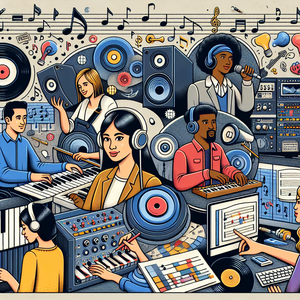
Exploring Career Pathways in the Music Industry: Beyond the Stage
The music industry is a dynamic and diverse field, brimming with career possibilities that extend far beyond performing on stage. While musicians and singers often receive the spotlight, numerous other roles are pivotal to the industry’s success, encompassing areas such as production, management, marketing, education, and technology. Whether you're seeking to enter the field or consider a career transition, it’s crucial to grasp the variety of available paths. This guide explores various careers in music, offering insights into job roles, industry trends, necessary skills, and growth opportunities.
Job Summaries:
Music Producer:
- Music producers are the masterminds behind the sound of recordings.
- They guide artists through the creative process from inception to final mix.
- They collaborate closely with musicians to hone their sound.
- Producers select the right studio settings, instruments, and technology.
- A solid foundation in music theory and production techniques is critical.
- Proficiency in audio software is essential.
- Most producers have formal education in music production or engineering.
- Producers have valuable industry experience.
- Their influence is paramount in crafting the music that resonates with audiences.
Sound Engineer:
- Tasked with the technical aspects of recording, mixing, and sound reproduction, sound engineers work hand-in-hand with artists and producers.
- Their role is vital in both live performances and studio recordings, ensuring that the sound quality meets high standards.
- A degree in audio engineering or a similar field is typically required, along with practical experience with sound equipment and software.
- Understanding acoustics and sound design enhances their effectiveness, making them indispensable to capturing and delivering artists’ performances.
Artist Manager:
- Artist managers are the strategic partners of musicians.
- They oversee various aspects of musicians' careers, including contract negotiations and promotional strategies.
- Artist managers foster connections with record labels, promoters, and other industry stakeholders.
- They create opportunities for their clients.
- Success in this role demands excellent communication skills.
- A sharp business mindset is required.
- An extensive understanding of the music industry landscape is necessary.
- While a degree in music business or management is often helpful, practical experience is invaluable.
Tour Manager:
- Responsible for the logistical coordination of an artist's tours.
- Tour managers ensure that all details, from scheduling to budget management, are meticulously handled.
- They serve as the primary liaison for artists and their teams, allowing performers to concentrate on their craft.
- Strong organizational abilities and problem-solving skills are crucial, along with experience in live event management.
- A background in music business can enhance a tour manager's effectiveness in this fast-paced environment.
Music Marketing Specialist:
- Marketing specialists devise and execute promotional strategies for artists and their music.
- Utilizing both digital and traditional media platforms.
- Creativity is essential in this role.
- Excellent communication skills are important.
- A keen understanding of current marketing trends is necessary.
- Many employers prefer candidates with a degree in marketing or communications.
- Experience in the music sector is preferred.
- This position enhances an artist’s visibility.
- This role drives music sales.
Booking Agent:
- Booking agents are responsible for securing performance opportunities for artists.
- They negotiate contracts with venues and promoters.
- Strong networking skills are essential for success in this role.
- Negotiation expertise is crucial for booking agents.
- Market insight is important for success in this role.
- A background in music business or management is advantageous.
- Experience in live events is beneficial for booking agents.
- Booking agents ensure artists gain exposure and income necessary for sustainable careers.
Music Journalist:
- Music journalists provide insights into artists, albums, and industry trends through research and writing.
- They conduct interviews and attend live performances, staying informed about developments in the music world.
- Excellent writing skills and a passion for music are critical, along with a degree in journalism or communications.
- Journalists help shape public perceptions of artists and highlight emerging music.
Music Teacher:
- Music educators teach students about various musical elements, including theory, instrument skills, and performance techniques.
- They may work in schools, private settings, or community programs, adapting their methods to fit individual learning needs.
- A degree in music education and teaching certification are typically required, along with strong communication skills and a love for imparting knowledge.
A&R Coordinator:
- A&R (Artists and Repertoire) coordinators play a vital role in talent discovery and artist development.
- They work closely with producers and marketing teams to align the artist's vision with market trends.
- Strong analytical skills are important for success in this role.
- A deep understanding of various music genres is also important.
- Most A&R coordinators have degrees in music business or related fields.
Music Licensing Manager:
- Overseeing the legalities of music usage across different media.
- Negotiating licenses with filmmakers, advertisers, and streaming platforms.
- A solid grasp of copyright law and intellectual property rights is essential.
- Often necessitating a degree in law or a related discipline.
Event Coordinator:
- Event coordinators plan and execute music-related events.
- They manage logistics, budgets, and vendor relationships.
- Attention to detail is critical in ensuring that events run smoothly.
- Strong organizational skills are essential for successful events.
Music Publisher:
- Music publishers manage rights and royalties for musical compositions.
- They promote songs to artists while ensuring songwriters receive fair compensation.
- A degree in music business or law is generally required.
- A thorough understanding of copyright issues is necessary.
Music Therapist:
- Music therapists use music as a therapeutic tool to address emotional, cognitive, and social needs.
- They work in various settings, including healthcare.
- A degree in music therapy is a prerequisite for this career path.
- Relevant certification is also required for music therapists.
- This is considered a fulfilling career path.
Digital Marketing Specialist:
- Specializing in online promotion
- Digital marketing specialists create content strategies
- Engage with audiences across digital platforms
- A degree in marketing or communications is typically required
- Experience in the music industry
Music Data Analyst:
- Music data analysts collect and interpret data on music consumption.
- They offer insights that help artists and record labels make informed decisions.
- Strong analytical skills are essential for success in this role.
- Familiarity with data analysis tools is also important.
This comprehensive overview underscores the vast array of opportunities within the music industry, each role playing an integral part in its overall vibrancy. Whether you are embarking on your career journey or contemplating a change, the music industry is ripe with possibilities catering to various skills and interests. By familiarizing yourself with the qualifications and trends associated with each position, you can better position yourself for a rewarding career in this dynamic field.
Explore More Jobs

